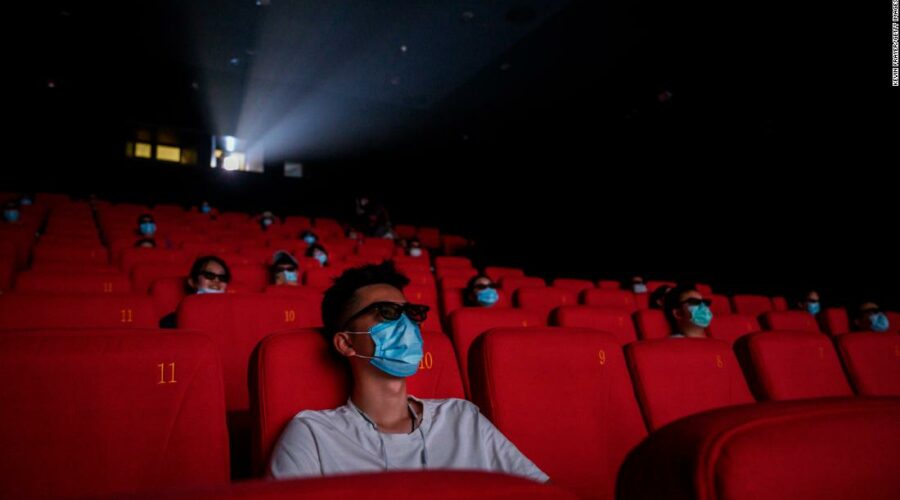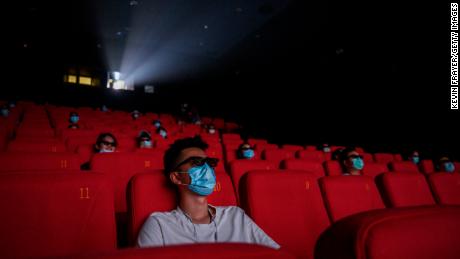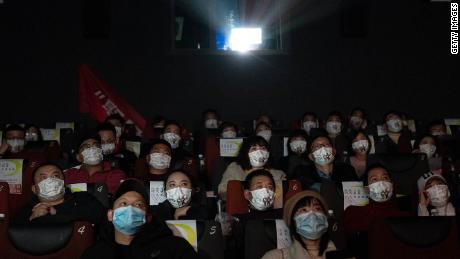Jake Tapper identifies key change in new 'Top Gun' movie that could anger China
Hollywood has long bent over backwards to give Chinese censors what they want. Not anymore.
Over the past year, producers behind some of the hottest US blockbusters have kept in scenes that could irk China’s censors, apparently less concerned about the potential loss of access to theaters across the country of 1.4 billion people.
As a result, some of the most anticipated movies released in recent months — including “Top Gun: Maverick,” “Spider-Man: No Way Home” and “Lightyear” — have not, and may never, hit the world’s second largest box office.
All films publicly screened in China need a permit from regulators. Censorship is rife, with authorities increasingly clamping down on what they perceive to be inappropriate, including in some cases the appearance of cleavage, tattoos or people smoking, as well as more obviously politically sensitive elements.
Take the new “Top Gun” sequel, now the biggest picture of the year. In a trailer released in 2019, the movie appeared to omit Taiwan’s flag, after a Chinese backer urged producers to do so, according to the Wall Street Journal. Later, once the investor, Tencent (TCEHY), reportedly dropped out, the symbol was reinstated on Tom Cruise’s iconic bomber jacket.
China and Taiwan have a complex relationship. Beijing’s Communist leadership has long claimed Taiwan, a self-governed democratic island, as part of its territory, despite having never ruled over it.
Now, executives at the film’s studio, Paramount (PGRE), no longer expect a mainland Chinese release, the Journal reported in May, citing anonymous sources.
The move was followed by another rebuff by Disney (DIS) and Pixar, which were reportedly asked by authorities in countries including China to remove a brief, same-sex kissing scene from their latest animated release, “Lightyear.” China has long cracked down on depictions of homosexuality.
Disney declined to make the cut, its producer, Galyn Susman, told Reuters, adding that she believed the film would also not open in the country. The movie, which has Chris Evans voice the role of titular space ranger Buzz Lightyear, premiered elsewhere last month.
A person familiar with the matter said that Disney had submitted the film for release in mainland China, and was awaiting an official response.
Sony (SNE) Pictures also found itself in a tight spot late last year, when it was asked by Chinese regulators to cut out or minimize the appearance of the Statue of Liberty in a scene in “Spider-Man: No Way Home,” according to the publication Puck. The company reportedly refused, and the movie was never shown in mainland theaters.
Sony and Disney did not respond to a request for comment, while Paramount declined to comment. China’s film regulators did not respond to a request for comment.
So why would these companies push back, putting tens or hundreds of millions of dollars at risk? For one, industry veterans say that China’s movie market isn’t what it used to be.
In recent months, film studios have begun to rethink the trade-off associated with appeasing censors in China, particularly as the country’s box office becomes more insular, more heavily regulated, and continues to be battered by Covid-19 restrictions, according to experts.
“There is 100% a shift” in how Hollywood regards Chinese censors, said Chris Fenton, former president of DMG Entertainment and author of the book “Feeding the Dragon: Inside the Trillion-Dollar Dilemma Facing Hollywood, the NBA, and American Business.”
“Pleasing Beijing no longer guarantees big revenues in China,” he told CNN Business. “Such risk and effort no longer guarantee results, and I expect this lack of certainty to prolong this era of pushback for quite some time.”
A tricky history
“It’s about damn time,” said Robert Cain, founder of Pacific Bridge Pictures, which helps Chinese and international partners develop entertainment projects.
In previous years, Hollywood studios were “kowtowing to the Chinese government, doing anything and everything they could to make sure their films got in, including debasing their films and themselves,” added Cain, who has done business in China and Hollywood for more than two decades.
“You would never be able to find a single studio executive who would utter a peep that could be perceived as critical of anything about China … Now we’re in a different situation, where I think the studios, because they see China as less of a golden goose, they’re feeling more emboldened to go their own way and push back.”
The hoops that filmmakers have jumped through are well documented.
In a 2015 report, the US-China Economic and Security Review Commission, a government agency created to brief US Congress, described how “with an eye toward distribution in China, American filmmakers increasingly edit films in anticipation of Chinese censors’ many potential sensitivities.”
One such example was the remake of the action movie “Red Dawn,” which “underwent expensive digital alterations” so that China was no longer portrayed as the villain, the commission wrote.
In 2012, MGM spent $1 million to make the change, Erich Schwartzel, a film reporter at The Wall Street Journal and author of the book “Red Carpet,” told CNN’s Jake Tapper.
And in 2016, a Tibetan character was reportedly rewritten as Celtic in the film “Doctor Strange” to avoid the ire of Chinese officials, noted Aynne Kokas, an associate professor of media studies at the University of Virginia and author of the book “Hollywood Made in China.”
Tibet, which has been controlled by the Communist government in Beijing since 1951, is one of the most sensitive subjects in Chinese politics.
Kokas also pointed to the decision this year by Warner Bros. to remove footage alluding to a gay relationship in the Chinese version of its latest “Harry Potter” movie. (Warner Bros. is owned by Warner Bros. Discovery, the same parent company of CNN.)
In a statement at the time, a Warner Bros. spokesperson told CNN Business it was “committed to safeguarding the integrity of every film we release.”
“A six-second cut was requested and Warner Bros. accepted those changes to comply with local requirements, but the spirit of the film remains intact,” the representative added.
That kind of behavior increasingly risks a backlash in Western markets.
There has been more “scrutiny placed on Hollywood by politicians, journalists, critics, and even movie fans in terms of anything viewed as pandering to Beijing,” said Fenton, suggesting that such scrutiny could ultimately lead “to lost revenue globally.”
Several bills have been introduced in US Congress, such as the “SCREEN Act,” which requires Hollywood studios to “provide written agreements pledging they will not edit their own films at the request of censorship from the Chinese Communist Party.”
Requests such as the one to remove the Statue of Liberty from “Spider-Man” have left studios on an unenviable tightrope, Kokas said.
“[For producers,] there’s not a guarantee that I’ll be able to double my profits, and I might actually damage my US market,” she noted. “I mean, removing the Statue of Liberty is something that could potentially draw negative attention to your film in a highly polarized US political environment.”
A tougher market
China’s box office rakes in billions of dollars a year, rivaling the United States and Canada combined.
In 2020, it became the biggest movie market on Earth, as its theaters were able to recover from the impact of the Covid pandemic more quickly than those in North America. The trend continued last year.
This year, however, the balance has tilted again. US theaters have bounced back, while China continues to maintain a strict “zero Covid” policy that keeps many of its cinemas in limbo. That puts North America’s box office slightly ahead so far in 2022, generating more than $3.6 billion compared with China’s roughly $2.7 billion, according to data from Comscore.
Another headache for Hollywood executives is whether China will even allow their movies into theaters, with or without censoring them.
While China typically permits the release of 30 to 40 foreign films a year, that number has fallen since the pandemic. The country allowed 20 theatrical releases of Hollywood films last year, compared to 36 in 2018, according to Artisan Gateway, a film industry consultancy and investment research firm.
Producers are also keenly aware of how fast the political environment can shift.
Kokas pointed to titles such as Marvel’s “Shang-Chi and the Legend of the Ten Rings” and “Eternals,” which were not released in mainland China. The movies were expected to be big hits in the Chinese market, given their ethnic Chinese-led casts and crew.
But they never came out in the country. The prevailing theories were that Simu Liu, the superhero star of “Shang-Chi,” and Chloe Zhao, director of “Eternals,” both received the cold shoulder after reportedly criticizing the Chinese government years ago, said Kokas.
China’s film regulatory agency and Marvel’s owner, Disney, did not respond to a request for comment.
Part of the difficulty is that “there used to be much more transparency on the part of Chinese regulators” about what they would accept, Kokas said.
Then there is the question of whether the films will still do well.
Chinese moviegoers have recently eschewed foreign films in favor of other titles, such as patriotic propaganda war movies, which have topped the box office domestically.
The share of the annual box office intake in China going to Hollywood movies has dwindled over the past four years, from 30.7% in 2018 to 13.6% so far this year, according to data from Artisan Gateway.
Rance Pow, the firm’s founder, also said that talent in the Chinese industry had become stronger. Local stories told “in Mandarin and portrayed with Chinese sensibilities … naturally appeal to local audiences, particularly as you move from urban to rural markets,” he noted.
“As Chinese producers venture further into the action and sci-fi genres in particular, where Hollywood dominated for many years, there will likely be increased competition from local fare.”
A gradual decoupling
China once made no secret of its ambitions to join forces with Hollywood.
In 2012, one of the country’s biggest conglomerates, Wanda, made a splash by buying AMC (AMC) for $2.6 billion, forming the largest cinema chain in the world.
The move was followed by a slew of deals that saw production studios like Legendary Entertainment and Dick Clark Productions get snapped up by Wanda, and Chinese firms such as Alibaba (BABA) show up as sponsors on big screens all over the world.
Recently, however, such funding has largely dried up. Wanda sold off most of its AMC stake last year, according to a regulatory filing.
Global mergers and acquisitions by mainland Chinese film companies have dropped, from 61 deals in 2018 to 15 last year and only one so far this year, according to data provider Dealogic.
The situation has led some critics to wonder whether Hollywood still needs China, or vice versa.
Several titles that have recently skipped Chinese releases still enjoyed huge commercial success. This summer, “Top Gun: Maverick” became the highest-grossing movie of the year, crossing the billion-dollar mark in global box office revenue, according to Comscore.
“Spider-Man” also enjoyed a record-breaking debut, and in December became the first movie to hit the billion-dollar milestone since 2019.
Kokas said that while the performances were promising, it was too early to write off Hollywood’s dependence on the world’s second largest economy.
However, China, which remains a massive film market despite missing out on some of the most popular global new releases, may not need American films.
“Xi Jinping’s ‘Made in China 2025’ policy makes clear that Beijing intends to eliminate most dependence on the West,” said Fenton. “Independence from Hollywood is only one small segment of that goal, and China has pretty much achieved it.”
The studios … see China as less of a golden goose.
Robert Cain, founder of Pacific Bridge Pictures
To be sure, “studios are still trying” to get into the country, Kokas noted.
But the lack of certainty means that some producers aren’t banking on its prospects there anymore.
Fenton said he knew of “at least one major Hollywood studio projecting zero [in revenue] for China now when they green-light movies,” given that “it’s now almost impossible to factor in the whims of the Chinese government at any given moment.”
“There’s still some opportunity there,” said Cain. “But it’s just not the same thing as it was.”
— CNN’s Beijing bureau and Frank Pallotta contributed to this report.
Source: Read Full Article









